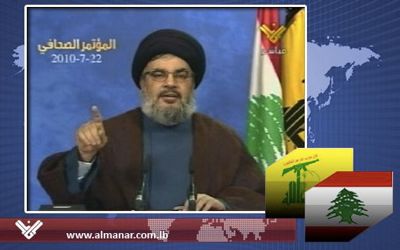
In Lebanon, over the past three weeks, danger signs have escalated amid considerably hightened tension.
The first red flag appeared when, at Israel’s behest, French UNIFIL soldiers attempted to penetrate illegally the homes of presumed members of the Resistance to confiscate their weapons. The matter was brought before the UN Security Council. The green light for the operation having been given by French Defense Minister Hervé Morin, France presented excuses through Claude Guéant, general secretary of the French President.
To ward off a recurrence, the Hezbollah put up posters in French addressed to the French soldiers that read: "The hand that touches the weapons of the Resistance will be cut off".
On 10 July, the French army conducted a significant evacuation exercise involving French nationals.
The Special Tribunal For Lebanon, which was created by the Security Council (officially in connection with the assassination of former Lebanese Prime Minister Rafiq Hariri) to serve as a political tool against Syria,
abandoned indictment procedures against Syrian President Bachar el-Assad and former Lebanese President Emile Lahoud, since as time went by the charges against them were proven false. Notwithstanding, it is not to be excluded that the Tribunal could still order an arraignment in September or October. At that point, according to Hezbollah Secretary-General Hassan Nasrallah, the Special Tribunal would be turned into a political instrument against the Resistance. It may indulge in false accusations, even more fanciful than the previous ones, but this time against the Hezbollah. This maneuver would aim to create internal dissidence and open the door for a new military attack by Israel.
In Washington, the Saban Center (Brookings Institution) and the Council on Foreign Relations have published two contradictory reports. According to the first one, Israel should be given complete leeway. The second report recommends, instead, that the Obama Administration should exert pressure on Netanyahu before, during and after the conflict with a view to containing it. These documents should be deciphered in light of the leadership rivalry that has subsisted between Tel Aviv and Washington for some time. The fact remains that both of these reports are based on the foregone conclusion that Israel is determined to get back at Lebanon and that no one will be able to stop it.

Maura Connelly appeared before the Senate on 20 July to be confirmed as next Ambassador to Lebanon. She backed the policy laid down by Obama’s Middle East peace broker George Mitchell: the United States should no longer pursue a direct confrontation strategy with the Hezbollah, which enjoys majority support among the population, but should seek to isolate it instead. In other words, Washington should pretend to interpret an Israeli war against Lebanon as a police operation against the Hezbollah and refrain from intervening openly.
On his part, de facto President of the Palestinian Authority Mahmoud Abbas sent a message to the Palestinian refugees in Lebanon asking them not to leave their camps during the offensive slated for this autumn. These instructions correspond to the points of consensus prevailing in Washington. Any attempt to use the Palestinians (mainly sunni) against the Hezbollah (mainly shiite) would be counterproductive for the interests of the United States in Lebanon and could spawn negative effects throughout the region.
















Stay In Touch
Follow us on social networks
Subscribe to weekly newsletter